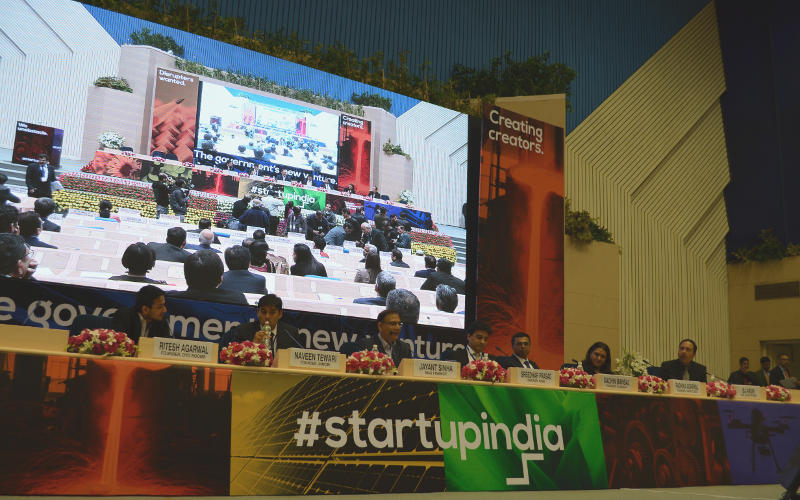- Home
- Internet
- Internet Opinion
- Startup India Is a Great Catchphrase. Can It Be More?
Startup India Is a Great Catchphrase. Can It Be More?

The Startup India, Standup India event that was held last week created a perfect media storm. DIPP secretary Amitabh Kant, who is credited with driving the Make In India campaign organised the equivalent of a TED Talks event, featuring a livewire act of A-listers, from politicians and bureaucrats, to billionaire tech oligarchs and tech entrepreneurs, all in one venue. They talked about why India is the greatest, and what it takes to be a successful startup entrepreneur, against the backdrop of agency-proofed catchphrases (We Unobstacle, Ecosystem Minus The Trappings Of The System, Creating Creators, etc.), followed by a headlining act that saw many announcements that everyone's heard about by now.
(Also read: Startup India Action Plan: PM Modi's 12 Big Announcements)
The venue was packed to the gills, and even if you weren't a part of it, the announcements made were meaty enough to make any entrepreneur take notice. The Rs. 10,000 crore fund of funds, announced in the 2014 Union Budget, has been concretised into an action plan that comes on the back of a funding winter in the startup ecosystem. The fourth quarter of 2015 saw a halving of VC investments according to CBInsights. The government's Rs. 10,000 crore innovation fund will be the most hotly contested and closely examined piece of the funding pie.
(Also read: Startup India: What 13 Startup Founders Want From the Government)
On the face of it, a lot of the details in the action plan are providing a bottom's up approach to entrepreneurship, making it easier to incorporate and dissolve a company. But there are a lot of caveats along the way, hoops that a startup must jump through to take advantage of these benefits. It requires certification from an inter-ministerial board, setup by DIPP, and the DIPP "may publish a 'negative' list of funds which are not eligible for this initiative." Here's what startups need:
Obtained certification from the Inter-Ministerial Board, setup by DIPP to validate the innovative nature of the business and:
a. be supported by a recommendation (with regard to innovative nature of business), in a format specified by DIPP, from an Incubator established in a post-graduate college in India; or
b. be supported by an incubator which is funded (in relation to the project) from GoI as part of any specified scheme to promote innovation; or
c. be supported by a recommendation (with regard to innovative nature of business), in a format specified by DIPP, from an Incubator recognized by GoI; or
d. be funded by an Incubation Fund/Angel Fund/ Private Equity Fund/ Accelerator/Angel Network duly registered with SEBI* that endorses innovative nature of the business; or
e. be funded by GoI as part of any specified scheme to promote innovation; or
f. have a patent granted by the Indian Patent and Trademark Office in areas affiliated with the nature of business being promoted.
This seems to go against the grain of unshackling startups, and instead is creating another layer of registration and paperwork for a startup. Sumanth Raghavendra, founder of Bengaluru-based Pitchdeck argues that artificial incentives like tax benefits lead to distortions and abuse. Besides, startups hardly book profits in the first few years of their operation, and some have wondered if this is just another loophole that older companies will use to dodge paying taxes.
Deepak Shenoy of Capital Mind, who has written an e-book on the Startup Tax and how it affects India's angel funding environment, points out that the proposed tax benefits are illusory.
For the latest tech news and reviews, follow Gadgets 360 on X, Facebook, WhatsApp, Threads and Google News. For the latest videos on gadgets and tech, subscribe to our YouTube channel. If you want to know everything about top influencers, follow our in-house Who'sThat360 on Instagram and YouTube.
Related Stories
- Galaxy S24 Series
- MWC 2024
- Apple Vision Pro
- Oneplus 12
- iPhone 14
- Apple iPhone 15
- OnePlus Nord CE 3 Lite 5G
- iPhone 13
- Xiaomi 14 Pro
- Oppo Find N3
- Tecno Spark Go (2023)
- Realme V30
- Best Phones Under 25000
- Samsung Galaxy S24 Series
- Cryptocurrency
- iQoo 12
- Samsung Galaxy S24 Ultra
- Giottus
- Samsung Galaxy Z Flip 5
- Apple 'Scary Fast'
- Housefull 5
- GoPro Hero 12 Black Review
- Invincible Season 2
- JioGlass
- HD Ready TV
- Laptop Under 50000
- Smartwatch Under 10000
- Latest Mobile Phones
- Compare Phones
- Itel Super Guru 4G
- Huawei Pura 70 Pro+
- Huawei Pura 70 Ultra
- Tecno Camon 30 Premier 5G
- Motorola Edge 50 Fusion
- Oppo A1i
- Oppo A1s
- Motorola Edge 50 Ultra
- Asus ZenBook Duo 2024 (UX8406)
- Dell Inspiron 14 Plus
- Realme Pad 2 Wi-Fi
- Redmi Pad Pro
- Cult Shock X
- Fire-Boltt Oracle
- Samsung Samsung Neo QLED 8K Smart TV QN800D
- Samsung Neo QLED 4K Smart TV (QN90D)
- Sony PlayStation 5 Slim Digital Edition
- Sony PlayStation 5 Slim
- Onida 1.5 Ton 3 Star Inverter Split AC (IR183PRS)
- IFB 2 Ton 3 Star Inverter Split AC (CI2432C323G1)

















